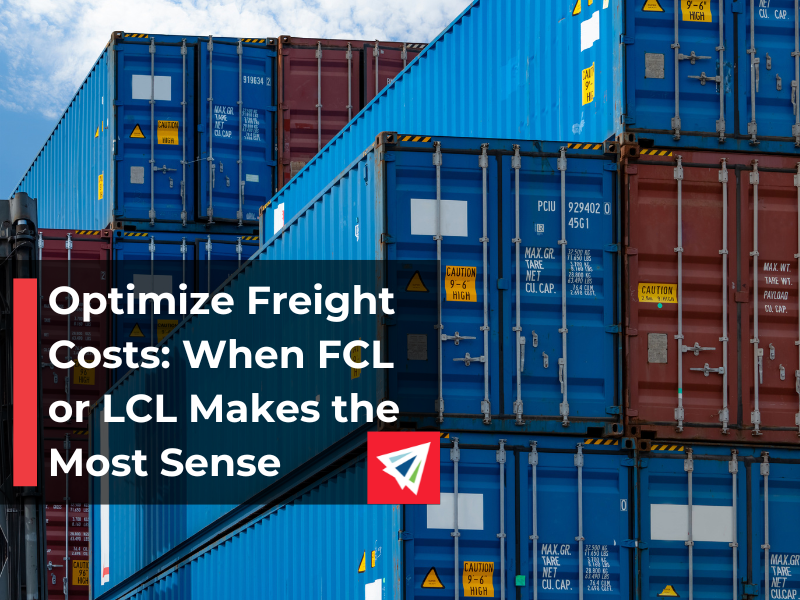Optimize Freight Costs: When FCL or LCL Makes the Most Sense
Choosing between Full Container Load (FCL) and Less Than Container Load (LCL) is more than a matter of shipment size, it can directly affect your cost, transit time, and supply chain efficiency. Whether you’re an importer scaling up or a shipper trying to squeeze more ROI out of your logistics spend, understanding when each option makes the most sense is key to optimizing freight costs.
Let’s break it down.
Understanding the Basics
At a glance:
- FCL (Full Container Load): You pay for exclusive use of an entire container (20ft, 40ft, etc.), regardless of whether it’s completely full.
- LCL (Less Than Container Load): Your goods share space with other shipments in one container. You only pay for the space you use, measured in CBM (cubic meters).
While FCL offers control and security, LCL provides flexibility and cost-effectiveness for smaller loads. But the real question is: which one actually saves you more money in the long run?
When Does FCL Make the Most Sense?
FCL is not a “one size fits all” option. However it is usually the more economical option when… you’re shipping high volumes, your goods are fragile/high-value/need sensitive handling, you need faster transit times with minimal stops or transfers, or you want more control over loading, unloading, and scheduling.
Even if the container isn’t fully packed, the predictability, speed and lower risk of damage or delays often justify the cost.
When Does LCL Make the Most Sense?
LCL is ideal when… you’re shipping smaller/infrequent or sample-sized loads. Your timeline is flexible and you’re not in a rush. You want to test new markets or products without committing to full loads. Or you’re optimizing cash flow by avoiding the upfront cost of a full container.
LCL allows you to stay nimble without having to wait until you have enough product to justify it.
Ask yourself:
Does my shipment have fragile or perishable goods? FCL means fewer hands on your product.
Is it oddly shaped or heavy? FCL gives you flexibility in loading.
Is it retail-ready or packaged for bulk? LCL may require extra prep and labeling.
Packaging strategy matters too. Efficient stacking and palletizing can tip the scales in either direction.
Hidden Costs to Be Aware Of
While LCL might appear cheaper up front, it can come with unexpected charges, such as: consolidation/deconsolidation fees, handling and inspection delays, potential damage or loss from shared containers, or longer dwell times at ports.
On the FCL side, the biggest hidden cost is paying for unused space, especially if your volume isn’t close to filling the container.
Thinking about moving from LCL to FCL?
Many companies start with LCL and move to FCL as demand and volume increase. Signs it’s time to switch:
- You’re consistently shipping more than 12-15 CBM.
- Your LCL shipments are being split across multiple containers.
- You’re facing inventory delays or stockouts from inconsistent delivery schedules.
Working with a logistics partner can help you forecast volume, plan better shipments, and consolidate orders more efficiently.
Leverage Your Freight Forwarder’s Expertise
At InterlogUSA, we help our customers make strategic freight decision every day. Our team runs cost comparisons, factors in time, and leverages our carrier relationships to ensure you’re not overspending on your freight.
The best freight strategy balances volume, cost, timing, and risk. Sometimes FCL wins. Other times, LCL is your best move. In many cases, a hybrid approach – using both, depending on seasonality, customer demand or product type – is what truly optimizes your freight spend.
Want help deciding which is right for your next shipment? Let’s talk.
_____________________________________________________________________________________
InterlogUSA continues to stay up to date on the latest in the market, to provide our customers and readers with the latest industry news. Should you have any questions, please send an email to our team today: [email protected] . Additionally, we have our weekly newsletter that can provide you with relevant freight news, updates, developments across the industry, and more.
